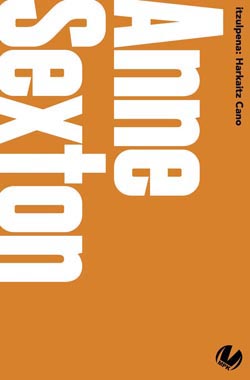
Neskatxa ezezaguna ama berrien gelan
Haurtxo, sei egun ditu jada zure arnas-lasterrak.
Etzanik, esku-koskor bat ohe zurian;
etzanik, barraskilo ukabildua, hain txiki eta indartsu
nire bularrean. Animaliak dira zure ezpainak; elikatzen zaitu
maitasunak. Ez da kontu txarra estreinako gosea.
Erizainek baiezkoa gandorraz; saski gurpildunetan
zaramatzate korridore almidoizkoetan,
gainerako deskabiratuak dauden multzora.
Katilu bat bezala okertzen zara; zure burua
nire ukimenaren bila. Badakizu nola garen elkarren.
Baina erakunde batena da ohe hau.
Ez nauzu luzaroan ezagutuko.
Medikuak esmaltea dira. Jakin nahi dute
gertaeren egia. Utzi ninduen gizonari buruz:
“pendulu-arima, halako gizonak mila,
bete zaitu umeaz, eme kaskarina”.
Baina gure senda-agiria zuri-zuri dago.
Ez dut zu hazten utzi besterik egin.
Orain gela osoak ikus gaitzan gaude hemen.
Arrotza naizela uste dute haiek, baina
ez dut hitz erdirik esan. Hutsik ni zu lehertzean,
airea zertan den ikas zenezan utzi nizunean.
Medikuek asmakizun bat antolatu didate
eta nik lepoa erakutsi diet. Ez baitakit erantzuna.
Zurea da ezagutzen dudan aurpegi bakarra.
Zure hezurra nirean, ene erantzunak edaten dituzu.
Egunean sei aldiz hautematen dut
zure premia, ezpainetako animalia, azala,
epel eta mardul handitzen. Ikusten ditut zure begiak
kanpin-dendak altxatzen. Harri urdinak goroldioan nabarmen.
Begiekin kliska dagizu, harrituta,
eta nik, nire artean: zer ikusten ote duzu,
ene besoetako pozkida, nire isiltasuna urratu ahala?
Gezurren aterpetxe bat naiz. Berriz ikasi behar nuke hizketan,
ala amore emanik zoramenari,
ukituko dut aurpegi ezagunen bat?
Korridorean behera saskiak berriro martxan.
Nire besoetako mahuka zara,
nire besoek eusten diete zure sahatsen hostoei,
zure nerbioen erlauntza basatiari,
zure lehen egunetako gihar eta tolestura bakoitzari.
Zure gizon zahar aurpegiak
hitzik gabe uzten ditu erizainak. Baina medikuek
errietan egin didate ostera. Mintzo naiz.
Zu zara nire isiltasunak mintzen duena.
Jakin behar nuke; esan behar nieke
idatz dezaten zerbait. Nire ahotsak eztarria
kezkarazten du: “Aitaren izena: ez du.” Besoetan zauzkat
eta sasiko izendatzen zaitut.
Oraingoz, hori da dena. Ez dago besterik
esan edo gal dezakedanik.
Ez da inork bizitza salgai jartzen duen lehen aldia,
hobe haiek isilik badaude. Estu besarkatzen zaitut,
ene bisitari hauskorra, zure hontz begiak ukatzeko.
Zure masailak lore dira ni ukitzean.
Igurzten zara nire kontra. Ahantz dezagun hau.
Ni naiz kulunkatzen zaituen ur ertza. Nigandik apurtu zinen.
Nik aukeratu dut zure bide bakarra, ene oinordeko ttipi.
Eskua askatu dizut, geure gu galduen dardaran.
Zoaz, ume; nire bekatua zara, ez besterik.
[1960]
Unknown Girl in the Maternity Ward
Child, the current of your breath is six days long. / You lie, a small knuckle on my white bed; / lie, fisted like a snail, so small and strong / at my breast. Your lips are animals; you are fed / with love. At first hunger is not wrong. / The nurses nod their caps; you are shepherded / down starch halls with the other unnested throng / in wheeling baskets. You tip like a cup; your head / moving to my touch. You sense the way we belong. / But this is an institution bed. / You will not know me very long. // The doctors are enamel. They want to know / the facts. They guess about the man who left me, / some pendulum soul, going the way men go / and leave you full of child. But our case history / stays blank. All I did was let you grow. / Now we are here for all the ward to see. / They thought I was strange, although / I never spoke a word. I burst empty / of you, letting you learn how the air is so. / The doctors chart the riddle they ask of me / and I turn my head away. I do not know. // Yours is the only face I recognize. / Bone at my bone, you drink my answers in. / Six times a day I prize / your need, the animals of your lips, your skin / growing warm and plump. I see your eyes / lifting their tents. They are blue stones, they begin / to outgrow their moss. You blink in surprise / and I wonder what you can see, my funny kin, / as you trouble my silence. I am a shelter of lies. / Should I learn to speak again, or hopeless in / such sanity will I touch some face I recognize? // Down the hall the baskets start back. My arms / fit you like a sleeve, they hold / catkins of your willows, the wild bee farms / of your nerves, each muscle and fold / of your first days. Your old man’s face disarms / the nurses. But the doctors return to scold / me. I speak. It is you my silence harms. / I should have known; I should have told / them something to write down. My voice alarms / my throat. “Name of father-none.” I hold / you and name you bastard in my arms. // And now that’s that. There is nothing more / that I can say or lose. / Others have traded life before / and could not speak. I tighten to refuse / your owling eyes, my fragile visitor. / I touch your cheeks, like flowers. You bruise / against me. We unlearn. I am a shore / rocking you off. You break from me. I choose / your only way, my small inheritor / and hand you off, trembling the selves we lose. / Go child, who is my sin and nothing more.